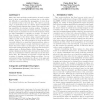Free Online Productivity Tools
i2Speak
i2Symbol
i2OCR
iTex2Img
iWeb2Print
iWeb2Shot
i2Type
iPdf2Split
iPdf2Merge
i2Bopomofo
i2Arabic
i2Style
i2Image
i2PDF
iLatex2Rtf
Sci2ools
KDD
2008
ACM
2008
ACM
Semi-supervised learning with data calibration for long-term time series forecasting
Many time series prediction methods have focused on single step or short term prediction problems due to the inherent difficulty in controlling the propagation of errors from one prediction step to the next step. Yet, there is a broad range of applications such as climate impact assessments and urban growth planning that require long term forecasting capabilities for strategic decision making. Training an accurate model that produces reliable long term predictions would require an extensive amount of historical data, which are either unavailable or expensive to acquire. For some of these domains, there are alternative ways to generate potential scenarios for the future using computer-driven simulation models, such as global climate and traffic demand models. However, the data generated by these models are currently utilized in a supervised learning setting, where a predictive model trained on past observations is used to estimate the future values. In this paper, we present a semisupe...
Data Mining | KDD 2008 | Series Prediction Methods | Time Series Forecasting | Time Series Prediction |
| Added | 30 Nov 2009 |
| Updated | 30 Nov 2009 |
| Type | Conference |
| Year | 2008 |
| Where | KDD |
| Authors | Haibin Cheng, Pang-Ning Tan |
Comments (0)

